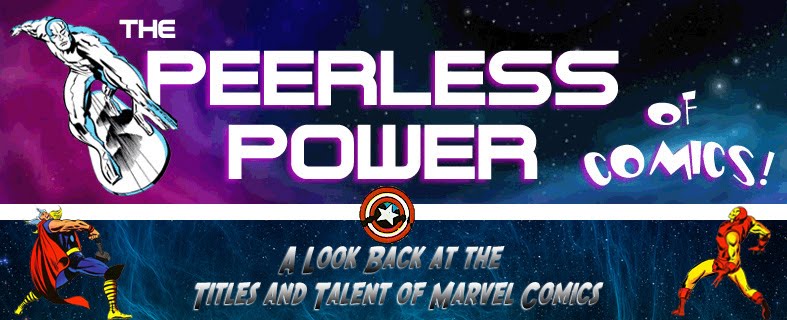If there's a listing somewhere of Marvel's Most Unlikely Adversaries to See Print, it's fair to speculate that Captain America vs. Doctor Octopus might be on it somewhere--maybe not in the top 10, or even the top 50, but if you skimmed down the entire list I think it would jump out at some point. It's hard to imagine why their paths would even cross--New York City is large enough to keep a lot of individuals' paths from crossing, nor does Ock really have any reason to try taking on the Avengers to somehow end up going head to head with Cap. Is it a matchup anyone would even be curious about? Ock is a headliner, yes, but I'd think a more interesting fight might be between Ock and Iron Man, as long as we're throwing names out there. (Of course, if Iron Man was shown to have a problem ripping Ock's metal appendages to mangled junk, it's not really an issue I'd plunk down 50¢ for.)
However, in mid-1981, it at least looked like EIC Jim Shooter was curious about how such a fight might play out--because even though he wasn't scripting the Captain America book at the time, he's credited with coming up with the plot for a story by David Michelinie that throws these two very different fighters together in conflict.
And if you're one of those who are still on the fence about whether or not this meeting should have taken place, the caption on the cover has already settled the matter.
But go ahead and shell out those four bits, because this Captain America story is a keeper.
While this is the first meeting between Cap and Ock, that segment of Shooter's plot is only part of the broader story to be told here, one that begins when Cap responds to a request to meet from a former Army corporal who had been instrumental in a skirmish that Cap was involved in during the war which saved the lives of countless American soldiers. And just as Cpl. Ray Coulson had been an Army courier, he asks Cap's help in conveying a message to his estranged son, John, who recently cleaned out the register of his father's business and ran off with a biker gang. The fact that Ray had decided not to call the police might tell you something of the substance of the message he's asking Cap to deliver--but that will become more clear shortly.
For now, we find Cap arriving at a converted barn which serves as the hangout of the "Huns," the bikers whose gang now counts John Coulson as a member. But Cap's desire to speak with John is met with a chilly reception, and undertones of hostility.
The choppers rev up, but Cap holds his ground, showing little signs of strain as the "test" continues. What he does show is surprise, when a wall of the barn suddenly shatters and a blatantly hostile adversary makes his entrance.
Given Cap's tendency to become
Regardless, Cap retrieves his shield--and Ock--in short order, with Ock being reacquainted with the shield in a manner other than how he'd intended.
Ock's subsequent (and humiliating) capture obviously served as a turning point for Cap's relationship with the Huns--but from this point, it will be Cap's words to John that may or may not do the same for John's relationship with his father. John has thus far been a figure virtually in the background of this story, even though he has been its focal point; but now, in the tale's closing pages, Michelinie has the opportunity to bring him, and hopefully his father, into true focus--and as a result, we're witness to a poignant ending that demonstrates why the Captain America book often stands out from the pack.
Seeing Cap "part the waters" as he made his exit, standing tall and obviously having made an impact on even the crass Huns, followed by the reconciliation scene between John and his father, comprise one of those "Captain America moments" that make the character one of Marvel's most unique heroes (though I still have an all-time favorite moment). And there are still ripples to be seen from Cap's actions here, as we catch up with John when he visits Avengers Mansion to convey his personal thanks to Cap--and a little something else.
Michelinie could have gone another route by having Ray make this gesture, rather than John--but we've already seen all we need to see of Ray's gratitude, written all over his face in his final panel. It's the turnaround in John, and the thanks extended to the man responsible, which help to make the entire story resonate--and it provides one more example of why Cap's earnest approach in coming to the aid of ordinary Americans shapes the man himself.
As endings go--easily in the top 50.
(I think even the Huns would agree.)
 | Captain America #259 Script: David Michelinie Pencils: Mike Zeck Inks: Quickdraw Studios Letterer: Jim Novak |














3 comments:
Thanks for the great recap of a great issue. I appreciate your blog and enjoy reading it!
LOVE this comic! It may have been my first Captain America solo comic
Anon, thank you!
HLF, I enjoy finding these gems among the Captain America series--they end up giving a boost to my day. :D
Post a Comment